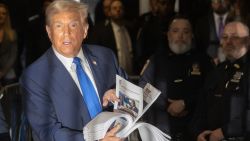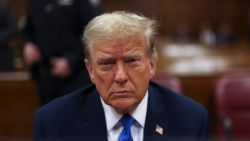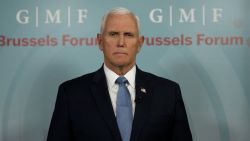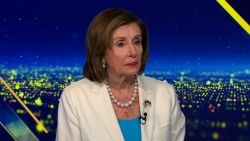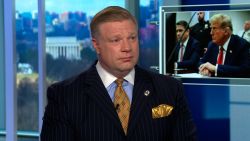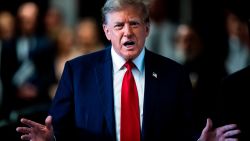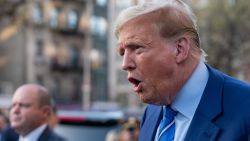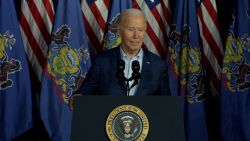President Donald Trump is driving the country through chaos from behind the wheel of his golf cart.
Over the Christmas weekend, he was the only man with the power to forestall a government shutdown on Tuesday, restore jobless benefits to millions of laid-off Americans and prevent further economic calamity in the days ahead.
Trump appeared interested in doing none of that until Sunday, when days after receiving it, he reluctantly signed a Covid relief and government funding bill his own administration helped negotiate and that his own aides claimed he’d approved days ago.
But his Sunday night signature was too late to prevent unemployment aid from lapsing.
The delay in signing the package, only to approve it after damage was done, is the latest example of Trump’s increasingly erratic behavior in the waning days of his term.
The delay — prompted by Trump’s late-in-the-game dissatisfaction with the size of direct payment checks to Americans, his irritation at Senate Republican leaders and a showman’s penchant for keeping people guessing — also pushed the government within 30 hours of shutting down.
All weekend, instead of explaining himself, Trump played coy, focused mostly on dead-end efforts to challenge his election loss rather than taking a step that would ease the nation’s hardships.
He remained out of public view in Florida, traveling back and forth to his namesake golf course without revealing his intentions. His top lieutenants, who might have wrung some clarity out of their truculent boss, were on their own holiday getaways: Vice President Mike Pence at the ski slopes in Vail and Treasury Secretary Steven Mnuchin near the beaches of Cabo San Lucas, Mexico.
Even in the lead-up to signing the bill, Trump seemed focused more on creating suspense than on appeasing Americans’ worries.
Seeming to realize the mess he’d created, Trump’s statement afterward appeared face-saving, insisting that one of his trade-offs for signing the bill was lawmakers agreeing to “focus strongly on the very substantial voter fraud which took place in the November 3 Presidential election” — a promise Senate Majority Leader Mitch McConnell made no mention of in his own statement praising Trump’s decision to sign the legislation. There is no evidence of widespread voter fraud in the election that Trump lost to President-elect Joe Biden.
As he departs office, Trump is intent on wielding — or, in this case, withholding — his executive authority in ways that punish his rivals, distract from his loss and ensure he remains the center of attention even as a lame duck.
He has been more unpredictable than at any point in his presidency, and aides on Sunday told CNN even as they pressed Trump to approve the relief measure, they couldn’t say for certain how he would proceed.
It’s a scenario that is thrusting fresh turmoil into the final days of his tenure as president. His souring relationship with Senate Republicans, sinking faith in his own administration aides and reliance on a conspiratorial new circle of advisers are fueling the sense that Trump is departing office on deeply unstable terms. He is due to remain at his Florida club for several more days, returning to Washington early in the new year to resume his futile efforts at overturning the election, including the January 6 Electoral College ratification Trump seems misguidedly convinced his allies can prevent.
“To play this old switcheroo game…I don’t get the point,” said Rep. Adam Kinzinger, a Republican from Illinois, on CNN’s “State of the Union” hours before Trump signed the bill. “I don’t understand what’s being done, why, unless it’s just to create chaos and show power and be upset because you lost the election.”
Trump’s waffling on the bill
A week ago, the prospect of a government shutdown and lapsing jobless benefits in the time between Christmas and New Years seemed far-off. Both chambers of Congress passed the package overwhelmingly and the White House was clear that Trump would sign it. Lawmakers left town.
But no one, it seemed, actually checked with Trump — or if they did, he wasn’t paying close enough attention to realize what exactly he was signing onto. Even after Trump released a video saying the direct payment checks in the bill were too low and complaining about the bevy of unrelated spending (which was actually included in the attached government funding mechanism), no one seemed to be able to get an answer on how he intended to proceed.
“He should have weighed in eight months ago…or at least eight days ago, and not after they finally reached agreement,” Gov. Larry Hogan, a Republican from Maryland and frequent Trump critic, said on “State of the Union” on Sunday.
On Christmas Eve, staff at Mar-a-Lago made preparations for Trump to sign the package, setting up a small table and arranging pens in one of the club’s ballrooms. But the plan was scrapped at the last minute, two sources with knowledge of the circumstances told CNN.
On Sunday, as he was preparing to leave for dinner at his nearby golf course, Trump offered a tease of his coming move, but still left even his circle of advisers in the dark about his intentions.
“Good news on Covid Relief Bill. Information to follow!” he wrote.
Finally, it emerged that Trump had indeed signed the measure after consulting with Republican leaders. In his statement afterward, Trump claimed he had secured concessions from lawmakers.
“The Senate will start the process for a vote that increases checks to $2,000, repeals Section 230, and starts an investigation into voter fraud,” he wrote.
He also said he would use executive authorities to remove what he’s deemed “pork” in the government funding bill — despite having proposed identical figures in his budget this year.
“I will send back to Congress a redlined version, item by item, accompanied by the formal rescission request to Congress insisting that those funds be removed from the bill,” Trump wrote. There is little expectation his requests will go anywhere.
McConnell, while praising Trump in his own statement afterward, made zero mention of the items Trump listed. He still lauded Trump for providing economic relief as “quickly as possible,” a laughable compliment given the days it took for Trump to sign the package.
After Trump signed the bill, a senior White House official voiced frustration that Trump relented on signing the deal over his demand for higher stimulus checks.
“What’s particularly hilarious is watching Trump quit on his coronavirus relief push while complaining about everyone quitting on his reelection. Why should any supporter fight for him when he quit on trying to get them more than a measly $600?” the senior official told CNN.
Preoccupation with score-settling
At other points in Trump’s presidency, shambolic staff work and breakdowns in communication have led to avoidable embarrassment. At its worst, government incompetence contributed to unnecessary sickness and death in a pandemic that has now killed 1 in every 1,000 American.
But never has the shoddy inner-workings of the administration failed in ways that risk the entire government shutting down and millions of Americans being denied jobless benefits that, only days earlier, they seemed guaranteed to continue receiving.
That even in the hours leading up to the bill’s approval no one on Trump’s staff appeared able to say exactly what he would do, or when he would do it, typifies a governing style that relies more on chaos and score-settling than on anything calculated.
At Mar-a-Lago and his nearby golf club this weekend, Trump did not appear preoccupied with the pending legislation, according to people who spoke to him. When the matter did arise, Trump returned to his initial complaints that it doesn’t pay Americans enough and is loaded with unrelated spending.
Instead, the topic Trump appeared more interested in was the election he lost and the bottomless well of fury he is now directing at fellow Republicans, who he believes have abandoned him during his hour of need.
Trump White House
Trump does not believe he owes McConnell anything now that the Kentucky Republican has acknowledged Biden’s victory — least of all his support on a coronavirus relief package that his own administration agreed to.
Last week, the President also vetoed the defense bill known as the National Defense Authorization Act, despite its broad support among Republicans and Democrats alike. His rejection was, in part, because the bill does not strip tech firms — whom Trump accuses of helping Democrats — of liability protections.
The move set up what could be the first veto override of Trump’s presidency, pitting members of his own party against him. The House will vote to override the veto on Monday, with the Senate returning later in the week if the vote is successful.
Still, just like Trump’s initial unwillingness to sign Covid relief will cause suffering not for Republican lawmakers but average Americans, if the NDAA fails to become law it will be American troops and their families who are denied pay raises, hazard pay and parental leave that are included in the bill.
Those who are caught in the devastation of the pandemic have little time for games.
“I don’t feel that any of them are reaching people like me. I honestly feel that we’re struggling, and they have no idea what it’s like,” said Lilli Rayne of Asheville, North Carolina, whose dog walking business has been devastated by shutdowns that mean dog owners are at home to care for their animals. “It’s been like a lot to deal with. Essentially for me, my day-to-day is gone, and a lot of my day-to-day is now sitting at home waiting for this to be over.”
An argument over higher direct payments is welcome, Rayne said — but not at the expense of getting what was agreed to out the door.
“Honestly, just pass the $600. We can fight for more later,” she said on CNN’s “Newsroom.”
“Right now, $600 gets two bills off my back or some of my credit card debt paid down so the interest won’t kill me in 2021. Like just pass something. There are people like my mother who need that.”



